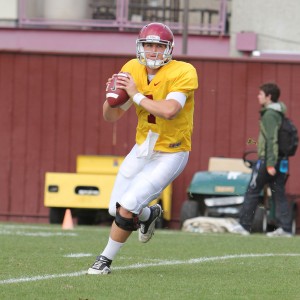2012 USC Trojans need to win big
We don’t have to look far for storylines from this year when it comes to USC’s athletic program. The overwhelming sentiment on campus remains: The football dynasty is back at last.
In the aftermath of two disappointing nine-and-eight win seasons in 2009 and 2010, respectively, the departure of beloved coach Pete Carroll and sanctions levied by the NCAA, USC put a lot of bad press to rest this past season.

Expectations · Since senior quarterback Matt Barkley announced his intention to return to school, hopes for the 2012 season have risen. - Chris Pham | Daily Trojan
It won 10 games. It closed the year ranked No. 6 in the final Associated Press top-25 poll — its first top-10 finish since 2008. Most importantly: Its star quarterback Matt Barkley signed up for his senior season, announcing his decision to return to school in front of media and caroling members of the Trojan Marching Band last December in Heritage Hall.
There has been a lot of good will, no doubt. That’s to be expected. Fans, particularly students, have been clamoring to see USC back atop college football’s biggest stage, and recent events suggest we’re watching its steady climb.
But in spite of what has transpired in recent months — Barkley’s announcement, a 50-point thrashing of UCLA in its season finale and upset win over Oregon — 2011 will be validated by 2012.
In other words, what we witnessed last season will be rendered largely meaningless if the Trojans can’t follow up on their performance in 2012. It’s unfortunate on some level, but with upper-echelon programs, this often becomes the case.
2011 was fun in several respects. The Trojans surprised a number of fans and pundits after initially being pegged to finish just outside the top 25 at the onset of the season. They ended up squashing a two-year skid against Oregon, in addition to toppling their rivals, UCLA and Notre Dame, by a combined 64 points. That naturally creates a fair bit of buzz and excitement around a program, which has been to just one bowl game — the Emerald Bowl — over the last three seasons.
But USC created the mantra and marketing slogan of “unfinished business,” implying some sort of grand finale come next fall. It fosters similar hopes and expectations, as well.
I posed the question last November, whether Barkley and coach Lane Kiffin would get a chance to write the final chapter to their “100 Tips For Surviving NCAA Sanctions” book. Well, they’re getting their chance now.
People nostalgically compared USC’s 2011 team to its 2002 team, and it made sense to some degree. The Trojans’ 2002 team began a string of 10-win seasons that lasted all the way until 2008. The year after its 11-2 finish in 2002, USC defeated Michigan by two touchdowns in the Rose Bowl and captured an AP national title. A year later, the team won another national title amid a 34-game winning streak. The implication of comparing the two teams was that USC’s 10-2 mark last season could similarly launch another run of decade dominance.
But naturally, you have to, well, dominate. That’s the difference.
2011 will always be seen by fans as a feel-good story. Despite no prospect of playing in a bowl, the Trojans closed the year with four consecutive wins and victories in seven of their last eight games. In short, they surpassed most everyone’s expectations. It’s a nice story.
The hope, though, has also been that it resuscitated the program in the wake of NCAA violations and launched the next era of USC football under Kiffin, Carroll’s successor.
But for a program that defines its success based on national championships and Rose Bowls — both are the only achievements tabulated on the exterior of the Coliseum press box — it needs to reach that level next fall. After all, 2011 was said to be a stepping stone, and if it truly is, USC needs to be stepping up to something higher.
“The 19th Hole” ran Mondays. If you would like to comment on this story, email Joey at [email protected] or comment below.
